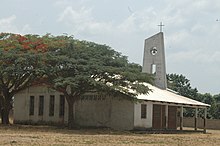Religion in the Central African Republic
Religion in Central African Republic by the Association of Religion Data Archives (2015)[1]
| Part of a series on the |
| Culture of the Central African Republic |
|---|
 |
| People |
| Languages |
| Cuisine |
| Religion |
| Music |
| Sport |

Christianity is the largest religion in Central African Republic, with Catholicism being the largest branch. Islam is practiced by 10 percent of the population.[2][3] The vast majority of Muslims are Malikite Sunni. It is believed that many of these followers incorporate traditional indigenous elements into their faith practices.[4]
Religious demography
Roman Catholic and Protestant missions are scattered throughout the territory. Islam is practised primarily in the north. About 42.4 percent of the population are catholic; another 26.6 percent are protestant. 18.9 percent are Muslim. Missionary groups within the country include Lutherans, Baptists, Grace Brethren, and Jehovah’s Witnesses.
Religious freedom
The constitution (suspended since 2003) provides for freedom of religion while prohibiting certain forms of religious fundamentalism. This prohibition is generally considered to be directed toward Christian and Muslim fundamentalists.[citation needed] Christian holidays are celebrated as national holidays. All religious groups must be registered through the Ministry of Interior. The Unification Church has been banned since the mid-1980s. The practice of witchcraft is considered a criminal offense; however, prosecution is generally made only in conjunction with other criminal activity, such as murder.
See also
- Demographics of the Central African Republic
- Central African Republic conflict – A sectarian civil conflict
- Islam in the Central African Republic
- Roman Catholicism in the Central African Republic
References
- ^ "Central African Republic". Association of Religion Data Archives. 2015. Retrieved 18 May 2020.
- ^ "Table: Christian Population as Percentages of Total Population by Country". Pew Research Center. Retrieved 16 April 2018.
- ^ "Table: Muslim Population by Country". Pew Research Center. Retrieved 16 April 2018.
- ^ International Religious Freedom Report 2010 - Central African Republic

